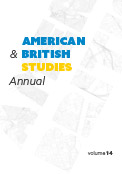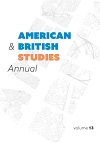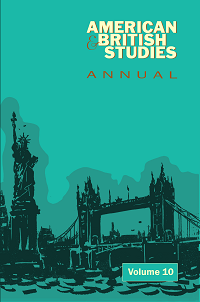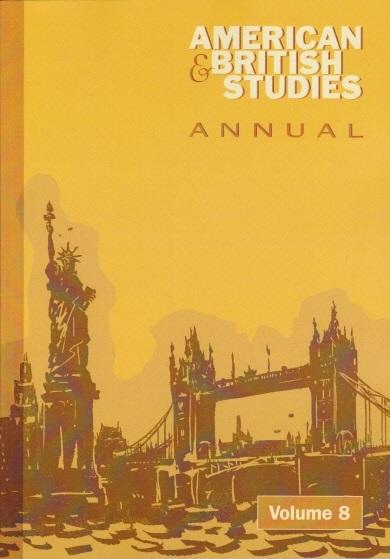
| ARTICLES |
PAGE |
ABSTRACTS |
|
Petr Chalupský |
9 | |
|
Eman K. Mukattash |
24 | ► |
|
David Livingstone |
41 | ► |
|
Michal Kleprlík |
52 | |
|
Šárka Dziurová |
64 | |
|
Lenka Žárská |
77 | |
|
Brigita Miloš and Dubravka Dulibić-Paljar |
94 | |
|
Václav Řeřicha and Libor Práger The Language of Images in Technologically Modified Environments |
108 | |
|
Brad Vice The Dangers of Intimacy: The Importance of Metacognition in Junot Díaz’s “How to Date a Browngirl, Blackgirl, Whitegirl, or Halfie” |
118 | ► |
|
Alena Gašparovičová Mirror, Mirror: Framing the Story of Snow White |
133 | ► |
|
Alice Tihelková Brick and Mortar Dreams and Nightmares: A Historical Look at the Role of Home Ownership in Britain |
142 | ► |
|
Petr Anténe When Tubal Tells The Merchant of Venice as Jessica’s Story: Clive Sinclair’s “Shylock Must Die” |
154 | ► |
ABSTRACTS, KEYWORDS AND CONTACT DETAILS
Author
Petr Chalupský
Title of the Article
Julian Barnes’s The Only Story – Within and Beyond the Author’s Idiosyncrasies
Abstract
Although Julian Barnes’s fiction is diverse in its generic, stylistic and narrative metamorphoses, in terms of its subject matter it has always been preoccupied with the theme of memory, with searching for the truth of what, how and why events happened in the past. The device of an ageing person recalling his younger years or attempting to reveal the secret of another’s past can be traced throughout Barnes’s career, but it has become especially prominent in his later works, which tend to be more grim and rueful. Their narrators are almost obsessed with the meaning of their existence as they contemplate its approaching end and mortality in general. The Only Story (2018) follows this course as it is told from the perspective of a retired man retelling the story of his youthful love affair and its consequences for his subsequent life. This paper discusses how the novel thematically and stylistically follows up on his 2011 Booker Prize winner The Sense of an Ending, but also how it offers a distinct narrative which, while responding to the previous works, still comes up with an original and invigorating variant of the novel of recollection Barnes has successfully exploited before.
Keywords
Julian Barnes, The Only Story, the novel of recollection, history, memory, intertextuality
Author
Eman K. Mukattash
Title of the Article
Transculturalizing Space in Arab Diasporic Poetry: A Spatial Study of Naomi Shihab Nye’s Poetry Collection Transfer
Abstract
In the aftermath of the spatial turn that started in the seventies of the previous century, much attention has been devoted to the representation of space in literary criticism. Prior to this, space either served as a background for the events in a literary work or was viewed within an extremely narrow scope which defined it as either central or peripheral. With such reductive readings, the need for a revolutionary critical approach to space in literary criticism has risen, not only in frequently read literary genres but in more recently developing ones. One case in point is Arab diasporic literature, in which space plays an integral role not only in shaping the diasporic relation to native and foreign lands, but in shaping the cross-cultural relations it engages in as well. In the poetry collection Transfer (2011) by the Palestinian-American author Naomi Shihab Nye, space is perceived beyond the physical reality of the native or the diasporic place which witnesses the interaction between the diasporic and the foreigner and is, therefore, transculturalized. As concluded from the analysis of a selection of the poems from Transfer, this transcultural space is marked a number of features. First, it cannot be defined geographically as central or peripheral, it cannot function outside a specific context, and it cannot be separated from the discourse of the text. In this sense, not only would adopting a spatial approach to Arab diasporic literature help deconstruct more traditional approaches to space, but it would also help address some of the most commonly raised questions in Arabic diasporic literature from a transcultural perspective.
Keywords
Spatiality, Arab diasporic poetry, peripherality, transculturalizing space, discourse, power relations, social interaction
Author
David Livingstone
Title of the Article
Free To Be… You and Me: the Best-Selling Record and Popular Show Which Made America Rethink Gender Stereotypes
Abstract
Long before wide-spread discussion of “toxic masculinity,” “mansplaining” and “gender identity,” we had Free To Be... You and Me by Marlo Thomas and friends. This paper will examine the cultural and historical impact of this ground-breaking record album, illustrated booklet and television special from 1972 and 1974 respectively. This project was the brainchild of the popular actress and social activist Marlo Thomas, with the proceeds from the project going to support the Ms. Foundation For Women, an extremely influential feminist organization. A number of leading entertainers participated in the project: Michael Jackson, Diana Ross, Alan Alda, to name but a few. Although initially met with great skepticism, the record and consequent television show became huge hits, becoming the sound-track for a generation of children growing up in the 1970s. I would argue that this project, more than anything else up until that time contributed to feminist consciousness raising and awareness of gender stereotyping and still has much to teach us today.
Keywords
feminism, gender identity, television, children’s entertainment
Author
Michal Kleprlík
Title of the Article
Doors Half-Open in Bluebeard’s Castle: George Steiner and His Heretical Essays in Modern Times
Abstract
George Steiner was a French-American polymath and polyglot. Along with Umberto Eco, Steiner has been ranked among the very last European metaphysicians as well as a leading cultural critic of the 20th century. Although an erudite scholar writing extensively in four languages about the most pressing issues of late modernity, Steiner has never been very popular among the general public. While his original essays won critical acclaim, by intellectuals he has also been rebuked for his ill-judged, doom-laden and reactionary elitist visions. The following paper deals with Steiner’s most thought-provoking, “heretical” texts on the nature of modern barbarism and the basic inhumanity at the heart of the humanities. The aim is to suggest possible reasons for Steiner’s “persona non grata” status.
Keywords
George Steiner, Holocaust, humanities, culture, post-culture, literacy, heresy
Author
Šárka Dziurová
Title of the Article
Sir Philip Sidney and the Kingdom of Bohemia: the Correspondence and Friendship of Philip Sidney and Thomas Jordanus von Klausenburg
Abstract
This paper sheds further light on Philip Sidney’s intellectual network in East-Central Europe, particularly in the Kingdom of Bohemia. Sidney (1554–1586) is celebrated as one of the greatest poets of the Elizabethan age. His immense contribution to the development of English literary culture is unquestioned. It is perhaps surprising to learn that he never expressed any great desire to pursue a literary career. His aim was to become a statesman, as his early biographies show. His career as a poet started after 1580, when he was forced to spend time in a country away from court and politics. Sidney’s personal experiences played a hugely important and formative role in his work. He had packed in a great deal into his life by a very young age, graduating from the most prestigious institutions in England and travelling in continental Europe. During his “grand tour,” Sidney established a network of correspondence with some of the leading intellectual figures in Central Europe. This paper will investigate an as-yet-unexplored figure in this network, the epidemiologist Thomas Jordanus von Klausenburg (1539–1585). Jordanus was acquainted with several figures in Sidney’s intellectual circle, including Thaddeus Hagecius ab Hayek (the Czech physician and astronomer), Hubert Languet (the French diplomat and Sidney’s principal mentor while he was in Europe), Johannes Crato (chief physician at the Viennese and Prague court), and Andreas Dudith (the Polish-based Hungarian nobleman, famous for his conversion from Catholic bishop to devout Lutheran).
Keywords
Philip Sidney, Thomas Jordanus von Klausenburg, Andreas Dudith, Thaddeus Hagecius, Hubert Languet, intellectual and correspondence network, mapping, Renaissance Kingdom of Bohemia
Author
Lenka Žárská
Title of the Article
“The world is in Amsterdam”: Amsterdam, the Netherlands, and the Dutch in Guinevere Glasfurd’s The Words in My Hand
Abstract
The article presents an imagological study of the recent historical novel The Words in My Hand (2016) by British author Guinevere Glasfurd with the focus on how the Dutch and the 17th century Netherlands are portrayed in the novel, especially regarding the use of stereotypes. After offering an introduction into how the Dutch were perceived by the English in the 17th century, the article goes on to argue that Glasfurd makes use of both historical and contemporary stereotypes in order to highlight the personal traits of the characters and create sympathies and antipathies in the reader. To do so, she not only employs stereotypes about the Dutch and their country, but frequently uses France as its superior counterpart. Thusly, she contributes to a larger discourse of literature which relies on the use of national stereotypes and perceives the nation and national character as perceptible actuality rather than a changing social concept.
Keywords
historical novel, British literature, imagology, the Netherlands, stereotypes, national character
Authors
Brigita Miloš and Dubravka Dulibić-Paljar
Title of the Article
Maternal Thinking in Doris Lessing’s The Golden Notebook: An Analysis of Impossibility
Abstract
The paper develops around the notion of motherhood in Doris Lessing’s seminal novel The Golden Notebook. Starting from the premise of Lessing’s persistent refusal of the label of feminist writer, but theoretically sustained through an elaboration of her stance on the novel’s readership, the main argument of the paper emphasises Lessing’s (semantic) accordance with the feminist motherhood theory of the early sixties. In addition, through the notion of motherhood, the article aims to provide an account respectful towards Lessing’s request for a complex and coherent reading of her work.
Keywords
Doris Lessing, feminist motherhood, motherhood, The Golden Notebook
Authors
Václav Řeřicha and Libor Práger
Title of the Article
The Language of Images in Technologically Modified Environments
Abstract
Each technology amplifies human functions, with photographs and videos enhancing vision and memory. The appeal of photography results from the fact that the stationary single eye is technologically extended. The technology of photography exceeds the limits of the eye, as the camera is a total stationary light catcher without the blurred edges of human vision. Photographs are “magical” and appealing because they suddenly offer an improved eye, another more powerful and extended recorder of visual events for eternity outside our memory. Recorded events are felt to have more reality than the original, while a photograph as an experience translated into a new medium “bestows a delightful playback of earlier awareness.”1 These are therefore ideal means of communication for the platforms of the digital environment of social media and esports. The rapid development of digital photography has had the effect of returning the user to the content of historical technologies, with video clips flipping back to mediaeval performances, social media communicating with images and symbols of the non-literacy environment of the Middle Ages, and 3D imaging flipping back to sculpting. Non-print perceptual learning is becoming more prevalent, with literate cultures rendered obsolete by the inclusive and instantaneous digital environment.
Keywords
digital environment, lineal literacy, enhanced perception, photography, involvement, communication
Author
Brad Vice
Title of the Article
The Dangers of Intimacy: The Importance of Metacognition in Junot Díaz’s “How to Date a Browngirl, Blackgirl, Whitegirl, or Halfie”
Abstract
This paper proposes a pragmatic reading of Junot Díaz’s short story “How to Date a Browngirl, Blackgirl, Whitegirl, or Halfie” by making use of Cultural Quotient (CQ, a/k/a Cultural Intelligence) a new branch of academics that draws from the fields of linguistics, psychology, anthropology, and international business to make one more culturally aware. Additionally, the paper gives focus to CQ Strategy, the metacognitive step of the CQ process, and uses the cognitive psychological concept Theory of Mind (ToM) to explain how human consciousness has evolved to read and anticipate the mental states of others. Both CQ and ToM depend on metacognition in order to navigate from one cultural context to another. The article attempts to explain how metacognition enables Díaz’s Dominican protagonist, Yunior, to become culturally intelligent as well as anticipate the emotions of the various American girls he dates and hopes to seduce. Finally, the article will propose what learners of a second language can gain from reading works by Díaz, and thus other cross-cultural fictions, by using a pragmatic approach to literature.
Keywords
Junot Díaz, cultural intelligence, metacognition, theory of mind, intercultural fiction, postcolonialism, second-language acquisition
Author
Alena Gašparovičová
Title of the Article
Mirror, Mirror: Framing the Story of Snow White
Abstract
The Queen’s mirror is an essential part of the classic tale “Little Snow White.” It is the driving force behind Queen’s actions and thus behind the whole plot of the story. In feminist criticism, the mirror is often interpreted as a tool of patriarchy that is meant to pit the female characters against one another. Many authors of modern fairy tale rewritings have thusly adjusted the position of the mirror in the story to show the influence it has on female characters. This paper will discuss two such rewritings, namely “The Tale of the Apple” by Emma Donoghue and “Snow White Learns Witchcraft” by Theodora Goss, focusing on how these two authors change the position of the mirror and what effect this has on the female characters. Despite the differences in the approaches of these two authors, the results of the altered role of the mirror share striking resemblances with regard to the messages their stories convey about female characters in a patriarchal story.
Keywords
“Little Snow White,” mirror, fairy tale, feminism, Emma Donoghue, Theodora Goss
Author
Alice Tihelková
Title of the Article
Brick and Mortar Dreams and Nightmares: a Historical Look at the Role of Home Ownership in Britain
Abstract
The nationwide preoccupation with the “property ladder” and the high premium placed on owning one’s own home have traditionally set Britain apart from other European countries, where renting has been a popular living choice carrying few negative social connotations. The view of home ownership as the affirmation of the individual’s full membership in society persists to this day, despite the UK currently facing a massive housing shortage and growing unaffordability of homes. Taking a historical perspective, the paper identifies the key developments that have contributed to home ownership acquiring such enormous social value for the British and reveals a number of adverse social consequences of the overemphasis on owner-occupancy. Special attention will be devoted to the concept of property-owning democracy and the Right to Buy policies spearheaded by Margaret Thatcher in the 1980s, with the aim of revealing how they contributed to the housing crisis Britain is experiencing at present. In addition to books dealing with history and cultural studies, the paper draws on recent sociological reports, blogs, newspaper articles and documentary films.
Keywords
home ownership, housing crisis, Right to Buy, Thatcher, property-owning democracy, council housing
Author
Petr Anténe
Title of the Article
When Tubal Tells The Merchant of Venice as Jessica’s Story: Clive Sinclair’s “Shylock Must Die”
Abstract
Shakespeare’s plays have attracted numerous reinterpretations not only on the stage, but also in other genres. Recent retellings of The Merchant of Venice by British Jewish authors, such as Arnold Wesker’s play The Merchant (1976) or Howard Jacobson’s novel Shylock Is My Name (2016), focus on a complex portrayal of Shylock as the main Jewish character. However, Clive Sinclair’s short story “Shylock Must Die” (2014) adopts a different strategy by foregrounding two other Jewish characters, as Shylock’s daughter Jessica is described from the point of view of the moneylender Tubal. In Sinclair’s version, Tubal is refashioned as a private detective who, despite his experience, can hardly believe how cunning Jessica turns out to be, as she tricks him into participating in her own scheme. While Shakespeare’s play assigns a significant amount of agency to Portia, Sinclair’s short story takes liberty in shifting the focus to another female character. As the story reports events that followed Jessica’s wedding, it may even be considered a sequel to The Merchant of Venice, and the story’s title itself suggests it has even less to do with comedy than the original. For all these reasons, “Shylock Must Die” presents a radical rewriting of Shakespeare’s text.
Keywords
British Jewish literature, contemporary British short story, Clive Sinclair, “Shylock Must Die,” William Shakespeare, The Merchant of Venice




